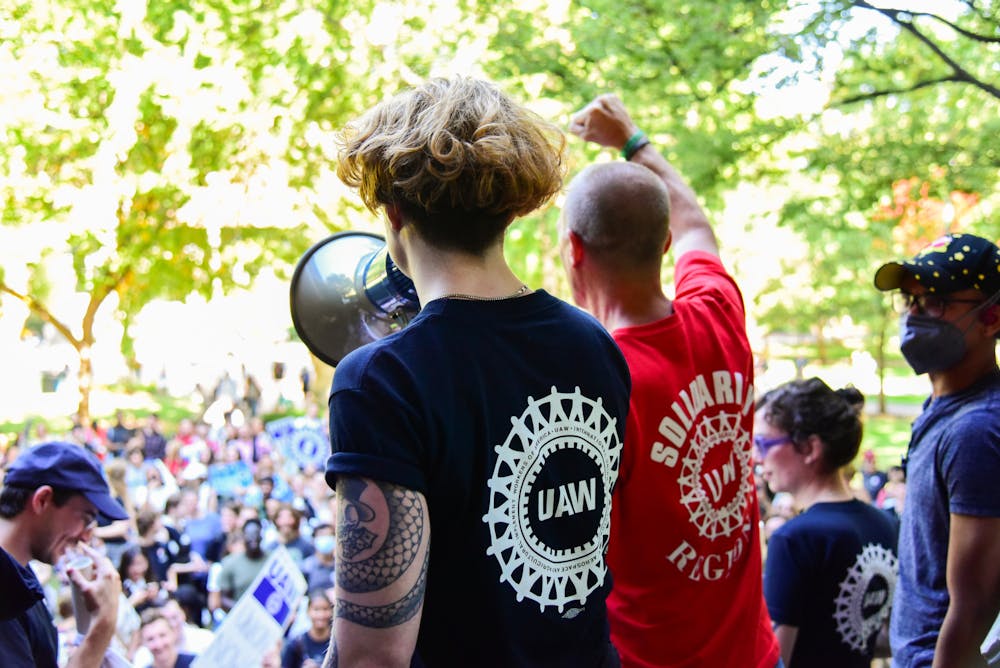
Penn’s graduate student workers voted to unionize by an overwhelming majority amid a wave of union activism among the student worker community.
The vote passed by a 1,807-97 margin. Over 2,300 eligible workers, all of whom are members of Graduate Employees Together — University of Pennsylvania, cast ballots in the election, which took place from May 1 to 2. About 400 graduate workers cast “challenged” ballots, meaning that the University and graduate workers disagree on whether these employees are eligible to vote.
GET-UP is now the largest union at Penn in recent memory, representing over 3,700 workers. Penn's residential advisors, graduate residential advisors, and Penn Medicine residents have also increased union campaigns in recent months.
“Today, after months of organizing and a series of delays by the university, we are thrilled to announce that we have won our union,” sixth-year history and sociology of science Ph.D. candidate and GET-UP organizer Sam Schirvar wrote in a press release. “This battle was hardfought, and every single worker who made time to organize played a part in this victory … We are urging the university to prepare to negotiate with us for a fair contract.”
A University spokesperson wrote in a statement to The Daily Pennsylvanian that the National Labor Relations Board will now certify the election outcome. When the certification is complete, United Auto Workers — which now officially represents GET-UP — will request to begin the collective bargaining process.
“At Penn, we engage as a community to advance what is important to us all — a dynamic and supportive academic environment,” the spokesperson wrote. “We look forward to working with representatives from the UAW to continue this important mission for Penn’s graduate and professional students.”
The election victory caps months of campaigning and unexpected delays. In October 2023, graduate students seeking to form a union filed 3,000 authorization cards with the NLRB, but the University subsequently refused to voluntarily recognize the union. The subsequent election was originally scheduled for April 16 and 17 but was suddenly postponed on April 11.
As graduate workers across Penn’s campus celebrate the victory, attention now turns to future bargaining efforts.
“This is a historic moment,” sixth-year communication Ph.D. candidate Brend Mahoney, who served as an election observer due to being ineligible to vote, told the DP. “[The union] is going to give us a seat at the table with Penn to win provisions for grad students that we very much need.”
Mahoney emphasized that all graduate student workers — even those unable to vote in the election — “make essential contributions” to the teaching and research at Penn.
“It's really important for workers to have a democratic voice in our workplace,” fifth-year English Ph.D. candidate Sam Samore added. “That right for workers is enshrined in the law. But we only take advantage of that right if we form a union.”
“This is an inspiring victory and shows the power of truly worker-led organizing,” Director of UAW Region 9 Daniel Vicente wrote in a press release. “We welcome these workers into the growing UAW Region 9 family. And we look forward to standing with them as we fight together for a strong first contract that achieves what they deserve and continues to raise standards for academic workers across the US.”
As GET-UP looks ahead to bargaining, United RAs at Penn — a union representing Penn’s nearly 220 RAs and GRAs — has reported “bad faith” bargaining efforts with the University as it nears the end of almost five months of negotiations. Penn’s RAs and GRAs originally voted to unionize by an overwhelming majority in September 2023, forming the first student union at Penn.
College senior and RA Conor Emery told the DP that Penn has been “consistently low-balling” the union’s proposals for increased wages for RAs and GRAs.
Currently, Penn RAs and GRAs are paid $600 a year, according to remarks from 2016 Graduate School of Education graduate and organizer with the Office of Professional Employees International Union Local 153 Scott Williams at a rally on May 8.
“Minimum wage laws do not exist for student workers,” he said. “That means these workers are not entitled to $7.25 an hour.”
According to Emery, United RAs at Penn is seeking $6,000 stipends for its workers, and he said the RAs told University negotiators that “we’re not accepting under $5,000.” He added that the University refused to go above a $1,000-per-year offer.
Residents and fellows at Penn Med are also rallying for higher wages and better benefits after voting to unionize in May 2023.
Over 100 Penn Med residents participated in a rally on May 1 to support the fight for higher wages, as residents work up to 80 hours per week for pay that they argue is insufficient.
The rally was attended by several local government officials, including City Councilmembers Jamie Gauthier, Nicolas O’Rourke, 1990 Penn graduate Nina Ahmad, Rue Landau, and Kendra Brooks, according to WHYY. State Rep. Rick Krajewski (D-Philadelphia) and state Sen. Nikil Saval (D-Pa.) also attended the event.
“We have appreciated the ongoing opportunity to hear directly from residents about their concerns during this unionization campaign," a Penn Med spokesperson wrote to the DP when residents first unionized. "We have an obligation to stay true to our shared goals to provide the very best care to our patients and to ensure that new physicians are able to train in an environment that allows them resources to flourish academically, professionally, and personally.”
GET-UP now looks ahead to beginning bargaining efforts after the official certification of their union, while United RAs at Penn and Penn Med residents continue their fight for a new contract and higher wages.
The Daily Pennsylvanian is an independent, student-run newspaper. Please consider making a donation to support the coverage that shapes the University. Your generosity ensures a future of strong journalism at Penn.
Donate






